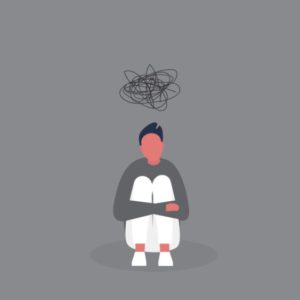Grief deserves more explanation
After the Session #49 newsletter on grief, I received lots of feedback. All touching and emotional, people wanted to either share their story, ask questions or point out that I could have said more or included deeper information. I agreed, so today's notes are about what else is important to think about as it relates to grief, at any time, but particularly during this Coronavirus pandemic and subsequent complete and total collective change of life.

Let's take a deeper dive
My last newsletter was delivered on Monday morning. By mid-morning I had received many notes that were about fear, anxiety, grief and loss. In some cases, people were just sharing how they felt and in other cases people had questions or thoughts that they wanted to explore. Based off of these emails, as well as subsequent sessions, here is a deeper dive into grief (please read session #49 first if you haven't already) during this difficult time.
More about grief:
1. You can move in and out of stages of grief - I talked about the classic 5 stages of grief but I didn't mention that you can go in and out of those stages. You may have already experienced denial, anger and bargaining and then all of a sudden you see someone playing with their kids at a playground and go back to anger, even rage. You may be triggered by having to keep your children inside, away from playgrounds and in masks. You may be angered by the thought of that parent allowing their children to possibly transmit the virus to others and also putting those children at risk. If you have been through anger and feel like you have moved past it, just know that certain triggers may bring you back to anger. This is natural in the process of grief as it is not a linear process.
2. There is a 6th stage of grief - more recent thoughts on grief have researchers believing that "finding meaning" is a stage of grief that follows acceptance. It doesn't take away pain but provides a soft landing for pain.
3. Collective grief - we are all dealing with a collective loss. The loss of the security of the world we knew, the schools we thought would always be open, hugging friends, our usual routines, the job we were sure was secure, the freedoms that we enjoy in this country. We will not be returning to the world before the pandemic. I shared this in the last newsletter but it seems it needs to be explored more. What I would add is that with the knowledge that we will eventually find meaning in this crisis (collective and individual) we will return to a new, more evolved place. We have to feel these feelings, we have to cry, we have to be present to how much we miss connection and safety.
4. Kids may be experiencing the worst loss they have ever had - for many children not having school, missing prom, wondering if they will get to walk across a stage to graduate, missing a championship game is the worst loss they have ever experienced. Parents may feel empathetic to that but then at times may get frustrated and think of how much worse off they have it or how they are just trying to survive. When you feel triggered in that way, you will need to stop that judgment. Everyone's losses are their own and shouldn't be judged.
5. Chronic grief - grief is thought to be acute (a loss just happened) or chronic (ongoing). While we are in it, the grief feels like it will last forever. It is important to remember that this time will come to an end. We have lost our old normal but know that there will be a new normal. This is not a new normal, this is part of a process, part of a crisis, and we are creating a path to normal. So, yes, we are in collective grief but cannot get caught in the trap of thinking that this heavy feeling of loss will last forever.
6. In order to get through this, we need each other - just as we are all in this collective loss together, we will also be in this together when it's time to rebuild. It is helpful to know that your neighbors, friends and families are all in similar boats. Sometimes when grief and loss are a part of your life, you may want to withdraw from others. Especially right now when we are in survival mode it would be easy to just hunker down. But keep in your mind that we got in this together and we will come out of this together.
7. All of us are grieving the loss of life as we knew it, others are grieving the death of loved ones - it has been heartbreaking to hear stories of those who couldn't be at the bedside of their loved ones as they passed away. We get reminders that there are still cancer patients, heart attacks and accidents happening every day. There are elderly patients in hospitals who don't know if they are going to make it out. However, it is unhealthy to compare your experience to another and deny your pain because you perceive someone else's to be worse. Have empathy for yourself and your own situation and trust that you can also have empathy for others. Making comparisons and discounting yourself makes it difficult to cultivate empathy for yourself and others. Give yourself permission to feel your loss and it will model empathy for your children and their own loss process.
Happy parenting, be easy on yourself and others...
